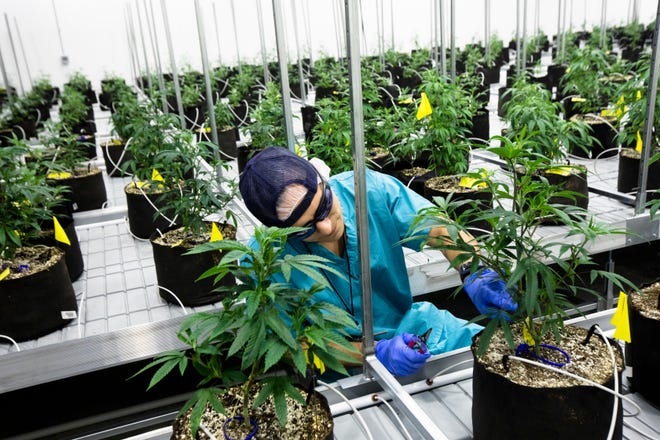
A proposed enlargement of Ohio’s medical marijuana program would award cultivation licenses to processors that sued the state over earlier denials, together with one owned by a well-connected Cincinnati businessman with deep roots within the business.
The supply is only one a part of a invoice handed by the Ohio Senate Wednesday that goals to revamp the program and permit docs to suggest marijuana for any medical situation. The invoice now heads to the Ohio Home for consideration.
The measure raises questions on whether or not the invoice offers a brand new path for sure processors to get licensed years after the Ohio Division of Commerce rejected their purposes.
For these companies, although, the laws presents the possibility to develop their very own marijuana as an alternative of counting on crops from different corporations to make edibles, patches and different merchandise.
“Individuals who know what they’re doing and make good product are ready to have the ability to profit the sufferers and can clearly profit from that,” mentioned Jimmy Gould, proprietor of CannAscend Ohio, which is among the many companies that might be granted a license underneath the invoice.
Licenses for rejected candidates
Senate Bill 261, sponsored by Sen. Steve Huffman, R-Tipp Metropolis, requires the primary main overhaul of Ohio’s medical marijuana program for the reason that state legalized it in 2016.
Huffman’s invoice would:
- Improve the variety of dispensary licenses in Ohio.
- Permit cultivators to increase their services.
- Let dispensaries promote on social media with out prior approval.
- Set up a division of marijuana inside the commerce division and take away oversight from the Ohio Board of Pharmacy to extra effectively regulate this system.
Most importantly for sufferers, the proposal would increase the number of ailments that could be treated with marijuana. Physicians may suggest the drug for any affected person, no matter situation, so long as they consider marijuana would assist alleviate their signs.
Huffman, who’s an emergency room doctor, and different proponents say the adjustments will in the end deliver down prices and make marijuana extra reasonably priced for sufferers who want it.
“This can completely save the medical marijuana business,” mentioned Gould, who led a failed legalization effort in 2015 and later helped craft the medical program. “If that doesn’t occur, there can be chaos.”
Gould’s enterprise is one among a number of that stands to profit from one other a part of the invoice, which qualifies standalone processors for a brand new class of cultivation license. These are processors that have been rejected within the first spherical of license purposes and obtained a certificates of operation for his or her facility by Oct. 1.
“You’re discovering it laborious to have a product or something to fabricate as a result of loads of the cultivators are simply passing it on to their very own producers,” Huffman mentioned.
Information point out this provision applies to not less than six processors within the state. Two of them – Gould’s CannAscend and One Orijin LLC, owned by Schottenstein Aphria – have been each events in a 2018 lawsuit that accused state officials of unfairly rejecting their cultivator license purposes. The businesses argued the Ohio Division of Commerce used a damaged course of that led to inflated scores and didn’t weed out conflicts of curiosity.
The case was ultimately dismissed.
Gould mentioned he had enter in Huffman’s laws and believes the processor rule will assist corporations preserve their very own model and handle prices. Finally, although, he sees the invoice as a possibility to enhance the affected person expertise.
“If it advantages me or different individuals like me, it’s a minor a part of the larger image,” Gould mentioned.
Work in progress
Senate lawmakers handed the invoice Wednesday with a 26-5 vote. When it strikes to the Home, Huffman plans to push extra adjustments that did not get via in time for Wednesday’s flooring vote.
Among the many proposed amendments: Including lupus to the record of qualifying situations and clarifying that standalone processors would solely be eligible for small-scale, degree II cultivation licenses. Proponents additionally wish to see housing and employment protections for sufferers with medical marijuana playing cards, however Senate President Matt Huffman, R-Lima, indicated which may be addressed in separate laws.
“I believe that should you’re doing one thing that’s lawful and you’ve got a lease for a home then you possibly can’t be kicked out and should not be kicked out,” he mentioned.
In the meantime, some enterprise house owners are annoyed over proposed necessities for a way giant their develop areas could possibly be.
Ohio’s large-scale, degree I cultivators can develop as much as 25,000 sq. ft of marijuana, and degree II cultivators are restricted to three,000 sq. ft. State rules allow licensees to increase to 75,000 sq. ft and 9,000 sq. ft, respectively. Huffman’s invoice would enhance enlargement for degree II growers to twenty,000 sq. ft whereas leaving degree I cultivators on the identical restrict.
“We don’t see the rationale of why as soon as license class must be singled out for that type of important development,” mentioned Andy Rayburn, proprietor of Buckeye Aid, a degree I cultivator close to Cleveland.
Rayburn additionally mentioned the invoice ought to keep away from codifying sq. footage limits altogether and permit the division of commerce to regulate them accordingly when the market adjustments, because it does now.
“We’ve already received a system in-built that works effectively,” he mentioned.
USA TODAY Community Ohio Bureau reporter Anna Staver contributed to this report.
Haley BeMiller is a reporter for the USA TODAY Community Ohio Bureau, which serves the Columbus Dispatch, Cincinnati Enquirer, Akron Beacon Journal and 18 different affiliated information organizations throughout Ohio.














